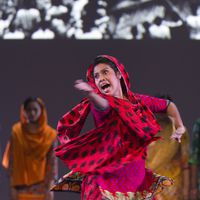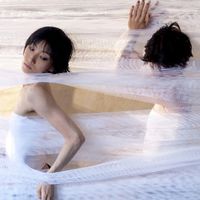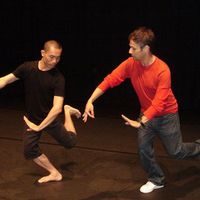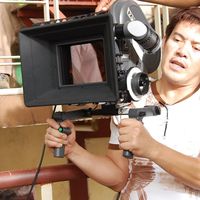Interview: German theatre director

[caption id="attachment_2848" align="alignright" width="270" caption="Helena Waldmann’s "BurkaBondage" © Sebastian Bolesch"]
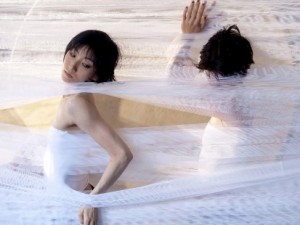 [/caption]
[/caption]Part 1 – Interview with Helena Waldmann
A week after the successful premiere of her new work “BurkaBondage,” I met German theatre director/choreographer, Helena Waldmann at Café Bravo in the trendy Berlin-Mitte. Respected for her bold character, very much reflected in her edgy works and professional engagements in places like Afghanistan, Iran and Palestine, Helena touches on sensibilities evident in individuals rather than the specificity represented in cultures. She has found a virtually iconic image for the parallels between both generations, for the fight for visibility and unleashing: Burka and bondage in her latest work staged at the Berliner Festspiele. Burka is an Afghan gown that covers people up. Bondage is a Japanese technique that shackles them.
“I wanted to take the clichés from both countries. The idea came from visiting Japan and Afghanistan. However, the work is not about Japan or Afghanistan per se, rather the “phenomena of withdrawal.” BurkaBondage is not a literal work. I don’t want to talk about Japan or Afghanistan. The work pertains to Burka and Bondage as instruments of withdrawal. People are so much affected by the aggression in society. There is too much of everything”, said the self-assured theatre maker.
She continues that her work is about people. “In BurkaBondage, I wanted to illustrate the interdependence and knotting together of practices, cultures as well as individuals. What interest me most is to see how close we are together or perhaps even closer than what we think. Yes, we are different. And by saying this, we are creating the borders. But between people, there lies the interdependence in polarisation. Thus, I thought of starting with clichés.”
In her past productions such “Return to Sender” and “Letters from Tentland,” she worked with performers/artists originating from the places where the pieces had been drawn from. So when I enquired her whether cultural specificity is necessary in the staging of her works, she retorted, “I don’t feel it’s right for artists to be labelled (culturally). Artists are usually open to work.
For instance in this piece, I chose two very different performers: Yui Kawaguchi (Japan) and Vania Rovisco (Portugal). Both have different body language and orientation, with Yui coming from a dance background and Vania from performance. On stage, they were together being different. Sure, you can see the Japanese face. But as the piece continues, she is no longer Japanese. Someone said after watching Yui (singing a Japanese lullaby), “Isn’t too old fashioned? After a while, I didn’t have the desire to show Japan or Afghanistan. I chose two strong performers.”
Helena views theatre as a science of understanding. She finds it equally interesting to see how thing work or don’t work. The enfant terrible says in full confidence that with BurkaBondage, “It’s either you like it or not. It’s not a theatre piece. It’s real time from spreading the parachute to the bondage. Everything takes time.”
She poignantly reflects when asked about her experience working in Japan that daily life is about observation. The director who conducted a workshop called “Shop without Work” for various Japanese artists in Tokyo in Summer 2008 said,, “People are being observed all the time. It’s not for the individuals to say, who I am. It has to be the others. I wanted to post questions: “What is work in our society?” What is freedom?” From the impressions I gathered in Japan, they are used to have a task to fulfil. So I didn’t tell them what to do. First, I gave them a present. I figured that in Japan, it is very important to give presents, how it looks like and how it’s presented. When they opened the presents, there was nothing in it. Sort of questioning, “Who are you?” And this can be a rather provocative question pertaining to individuality. They were afraid (fearful) and so some people wrapped it again.”
In response to the question of similarities and differences of working in Europe and Asia in general, Helena recants, “When I gave the workshop, it was somehow striking how similar the people reacted in Japan and Germany. They were puzzled. In the process, I felt comfortable there and rather proud that I knew how to communicate. I came as the enfant terrible so I don’t have to obey.
“Being in Japan inspired me a lot. I met one director who said ‘Reality is more potent and harder than what theatre can be.’ He shared with me a story of witnessing in the tube a man burning himself while people just watched, not knowing how to react. With this story, I think that burning oneself is a sign for the society. It is a reflection on how they feel treated by the society somehow. Observation, functioning, working – that’s what we do in life.
“With my work in Berlin, I have total freedom and at the same time, there remains this feeling of not being so free. We also have to obey. If you just do what you want to do, you can fall off. If what you do is not known, allowed or something that does not fall within the expectations – people just punish you if it’s not in the common rules.”
Asked whether this affects her way of working and what she finds sexy in the process of creation? Without batting an eye, she asserts, “For me it’s sexy to travel and find things, “fundstücke.” Finding something or objects from somewhere and construct out of the “fundstücke.” I am not interested in fulfilling functions nor is it my intention to answer questions.”
Following the project on withdrawal, Helena’s next project is Forget It. Essentially, it is a reminder that when one cannot forget, one cannot live.
>>Back to main interview article: Asia-EU performing arts: cultural influences
>>Interview with one of Thailand’s foremost contemporary choreographers and performers, Pichet Klunchun.
About the Writer:
Vanini Belarmino is the contributor for Performing Arts Asia for culture360.org. She is a Berlin-based producer and curator specialising in interdisciplinary exchange and cross-border collaborations. She is the Founder and Managing Director of Belarmino&Partners, an international project management and promotions consultancy for arts and culture.

